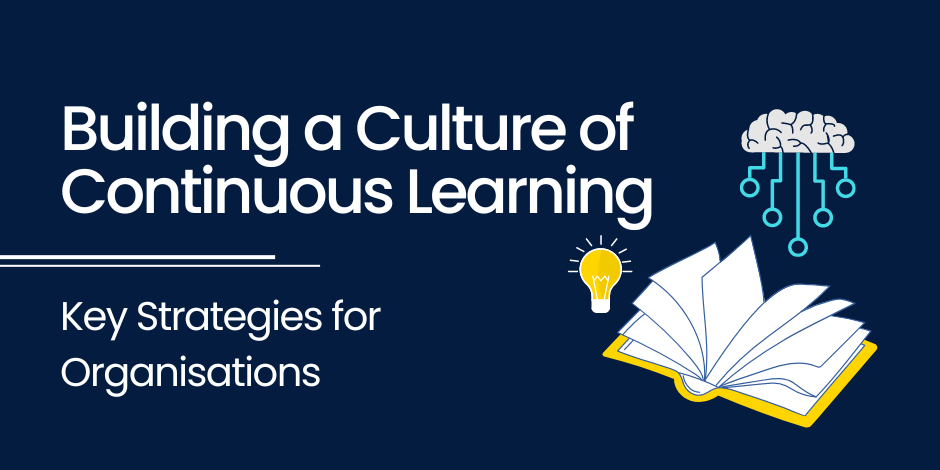Building a Positive Culture of Continuous Learning: Key Strategies for Organisations

Stay Informed With Our Weekly Newsletter
Receive crucial updates on the ever-evolving landscape of technology and innovation.
Continuous learning is a fundamental cornerstone of success in today’s fast-paced and ever-changing business landscape. Organisations must foster a culture of continuous learning to adapt to new challenges and stay competitive.
Understanding the importance of a culture of continuous learning

To fully appreciate the significance of continuous learning, it is essential to define it within an organisational context. Continuous learning refers to acquiring knowledge, skills, and insights that enable individuals and organisations to adapt, innovate, and thrive in a dynamic environment.
Continuous learning is not limited to individual development but also organisational learning. Organisations must actively seek opportunities to learn from their experiences, both successes and failures, to improve processes, enhance performance, and drive innovation.
Ultimately, continuous learning enables organisations to anticipate changes, be ahead of the competition, and achieve sustainable growth. By fostering a culture that values and prioritises learning, organisations can create a competitive advantage that sets them apart in the marketplace.
Defining continuous learning in an organisational context
When we speak of continuous learning within an organisational context, it encompasses more than ad-hoc or sporadic training programs. Instead, it refers to integrating learning into the organisation’s fabric, making it a core part of the culture and day-to-day operations.
In a learning culture, individuals are encouraged to seek out new knowledge and skills to address immediate needs and prepare for future challenges. It goes beyond traditional training sessions to include informal learning opportunities, such as coaching, mentoring, and communities of practice.
The role of continuous learning in business success
A culture of continuous learning directly impacts business success by fostering innovation, increasing employee engagement, and improving overall performance.
Organisations encourage employees to think creatively, challenge assumptions, and seek new solutions by promoting a learning mindset. This leads to innovation and the ability to adapt quickly to changing market conditions.
Furthermore, continuous learning enhances employee engagement by providing opportunities for personal and professional growth.
Employees who feel supported and valued in their development are more likely to be motivated, committed, and productive.
Ultimately, a culture of continuous learning contributes to achieving long-term organisational goals, such as increased profitability, improved customer satisfaction, and sustainable growth.
Laying the foundation for a learning culture

Building a learning culture requires a deliberate and systematic approach. It involves creating an environment that promotes continuous learning.
The elements of a learning culture
Certain key elements characterise a learning culture:
- Openness to new ideas and perspectives.
- A focus on learning from mistakes and failures.
- Collaboration and knowledge sharing.
- A supportive and inclusive environment.
- Opportunities for growth and development.
These elements create an atmosphere where individuals feel empowered to take risks, share knowledge, and pursue ongoing learning and development.
Steps to initiate a learning culture
Initiating a learning culture requires a systematic and intentional approach. Here are the key steps organisations can take to lay the foundation for a culture of continuous learning:
- Set a clear vision and communicate it throughout the organisation.
- Lead by example – Leaders should demonstrate a commitment to learning and encourage their teams to do the same.
- Provide resources and support for learning and development initiatives.
- Embed learning opportunities into everyday work processes.
- Celebrate and recognise learning achievements.
- Evaluate and continuously improve learning programs and initiatives.
By following these steps, organisations can create a culture that supports and encourages continuous learning, setting the stage for success.
Strategies to foster a culture of continuous learning

With a learning culture, organisations can implement specific strategies to foster continuous learning among employees.
Implementing learning and development programs
Formal learning and development programs provide structured opportunities for employees to develop their skills and knowledge. These programs can take various forms, such as workshops, seminars, online courses, and certifications.
Organisations need to align learning and development programs with the strategic goals and objectives of the organisation.
By identifying the skills and competencies required to achieve those goals, organisations can design programs that address specific gaps and support individual and organisational growth.
Encouraging employee engagement in learning
Engaging employees in the learning process is crucial for the success of continuous learning initiatives. Here are some strategies to promote employee engagement:
- Encourage self-directed learning by providing access to resources and tools.
- Offer opportunities for collaboration and peer learning.
- Recognise and reward employees’ learning achievements.
- Provide regular feedback and support for ongoing development.
- Create a culture of curiosity and continuous improvement.
By implementing these strategies, organisations can create an environment where employees are motivated and empowered to engage in continuous learning.
Overcoming challenges in building a learning culture
While building a culture of continuous learning is critical for organisational success, it has its challenges. Organisations must be aware of potential obstacles and address them effectively.
Identifying potential obstacles
Some common challenges in building a learning culture include:
- Lack of time and resources for learning and development.
- Resistance to change and fear of failure.
- Lack of leadership support or buy-in.
- Difficulty in measuring the impact of learning initiatives.
Identifying these obstacles is the first step in overcoming them.
Solutions for common challenges
To overcome the challenges regarding building a learning culture, organisations can implement the following solutions:
- Allocate dedicated time and resources for learning and development.
- Create a supportive and safe environment that encourages risk-taking and learning from failures.
- Engage leaders as learning champions and provide them with the tools and resources to support continuous learning.
- Implement effective measurement and evaluation strategies to assess the impact of learning initiatives.
By proactively addressing these challenges, organisations can overcome obstacles and create an environment that fosters continuous learning.
Measuring the impact of a learning culture

Measuring the impact of a learning culture is essential to ensure that learning initiatives deliver the desired results and drive positive business outcomes.
Key performance indicators for continuous learning
Organisations can use the following key performance indicators (KPIs) to measure the impact of a learning culture:
- Employee satisfaction and engagement levels.
- Individual and team performance improvement.
- Reduction in error rates and increase in quality.
- Enhanced innovation and problem-solving capabilities.
- Attraction and retention of top talent.
By regularly tracking these KPIs, organisations can assess the effectiveness of their learning initiatives and make data-driven decisions to improve and optimise their continuous learning programs.
The long-term benefits of a learning culture
Organisations that successfully build a culture of continuous learning stand to gain numerous long-term benefits, such as:
- Increased employee satisfaction, engagement, and retention.
- Enhanced innovation and adaptability.
- Improved performance and productivity.
- Strengthened competitive advantage.
- Greater organisational resilience in the face of change.
Conclusion
Building a culture of continuous learning is a strategic imperative for organisations seeking to thrive in today’s rapidly evolving business environment.
Organisations can create an environment that promotes ongoing development and growth by understanding the importance of continuous learning, laying the foundation for a learning culture, implementing specific strategies, and overcoming challenges.
Through continuous learning, organisations can foster innovation, enhance employee engagement, and achieve sustainable success.
Unlock the essence of continuous learning, the silent engine driving the world’s most successful companies. The future of your organisation hinges on its ability to adapt, innovate, and grow—and the key lies in fostering a culture of constant learning.
Visit the Institute of Data today and discover how our corporate training programs can transform your business.


